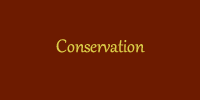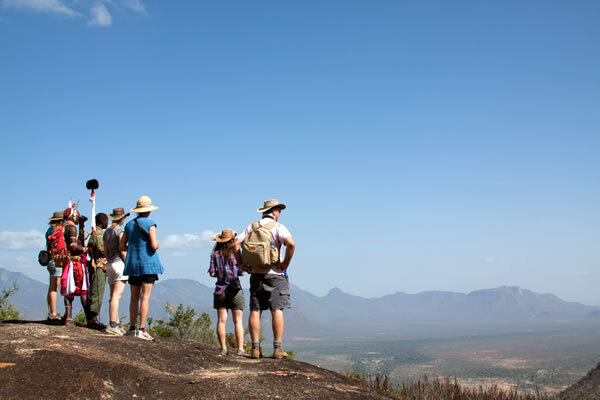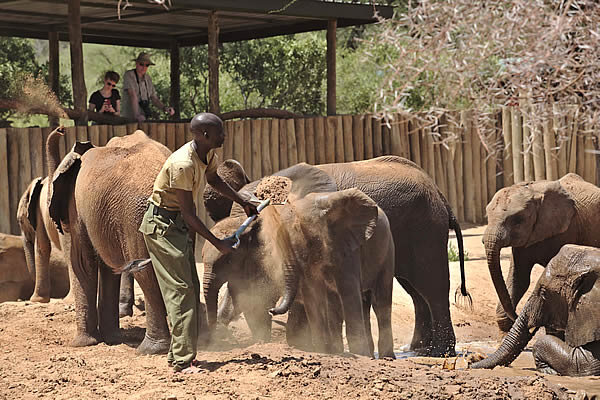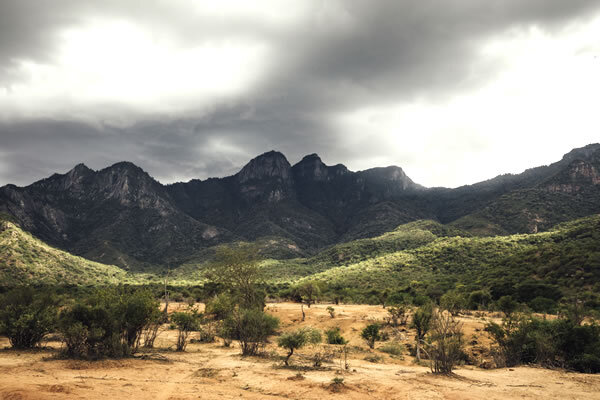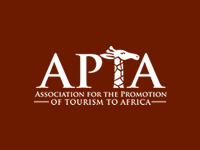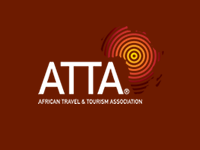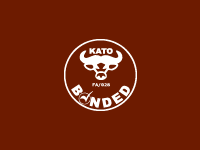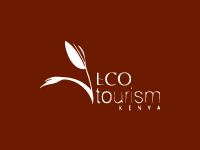Conservation
The Mathews Range, or Ol Donyo Lenkiyieu, was once renowned for its numbers of Elephant and Rhino, attracting explorers, hunters and writers from across the world to experience this dramatic wilderness. Approximately 4,000 Black Rhino and 15,000 Elephant roamed the area, browsing back the vegetation and maintaining a grassland cycle that attracted a multitude of other wildlife, including Buffalo and Lion. The surge in the international demand for Elephant Ivory and Rhino Horn and the banning of hunting in 1977, created a highly tenuous environment for many key ecosystems and the wildlife across Kenya suffered. Without protection Elephant and Rhino numbers plummeted, and by the early nineties there were no Black Rhino left in the Mathews, and only around 400 elephant. This dramatic change caused a lot of damage to the surrounding ecosystem. With no keystone species to bulk browse the vegetation, the area moved from a grassland cycle to a woodland cycle leaving the area devoid of any wildlife due to the lack of grass and increased instances of drought. The land also became less and less productive for the Samburu and their livestock.
By 1995 the community conservation movement was beginning to emerge in Kenya and communities started to take on the idea that conservation could in fact improve their land and their livelihoods through conservation. Namunyak Conservancy was set up in the same year encompassing the entire Mathews Range, a key water tower for Northern Kenya and once home to one of Kenya’s largest elephant populations. The 850,000 acre conservancy hosts approximately 2,300 registered families who collectively own and manage the land, using it for their livestock, honey gathering and wildlife conservation. The Conservancy locally employs sixty eight wildlife rangers to patrol the Afro Montane cloud forest and savanna plains below. It also hosts the Reteti Elephant Sanctuary, and a wildlife research and monitoring programme in partnership with San Diego Global. The Conservancy falls under the umbrella of the Northern Rangelands Trust, and has been a flagship model that has spearheaded the community conservation movement in Kenya
Since then, Elephant started to return to the now secure and protected Sarara valley, and as they browsed the bush and opened up waterholes and grassland, other wildlife followed. The community in turn started to see tourism revenue from Sarara as travelers from across the world came to see their wildlife, alongside healthier pastures and water sources for their livestock . Fast forward to today and the Mathews Range holds up to 4,000 Elephant. By 2018 poaching numbers had reduced by 90%, and 1,300 scholarships and bursaries had been awarded. The story of Sarara has become a flagship model for conservation on community land across Africa, and continues to act as a model that improves livelihoods through the restoration and preservation of the environment.
At Sarara we believe that conservation is as much about people as it is wildlife. With an ever changing demographic in rural Kenya, and as the country develops at rapid rates, the pressure on all wild spaces is unprecedented. We believe that building capacity at the grass roots levels, and equipping communities with the right tools to improve their livelihoods, whilst protecting their land holds the key to wilderness preservation.
The mobile Montessori programme provides access to effective and relevant education to the Samburu community living within Namunyak Wildlife Conservancy. The programme remains sensitive to traditions and offers a highly effective and practical form of learning. The entire teacher team is from the local community and is managed by AMI, Association Montessori Internationale.
Reteti represents an ever-growing movement of grass roots level, community focused conservation that is gaining huge momentum in Northern Kenya. Once heavily poached and severely degraded by instability, the northern rangeland is now restoring itself through transparent, self-governed community conservancies that promote the preservation of natural resources in order to create stability, employment and revenue. Reteti is designed to rescue and release orphaned and abandoned Elephant calves, whilst creating much needed benefits to the local people that live alongside them. This is seen through the representation of the communities standing united for wildlife, in recognition of the value that they can cultivate.
“Our goal is to inspire a global community of conservationists to help us create long term sustainability for Kenya’s magnificent cultural and natural heritage. At Sarara, our flagship blend of experiential travel, Conservation and Community offers a truly unique and immersive experience that gives back to the people and the land that need it the most.”







